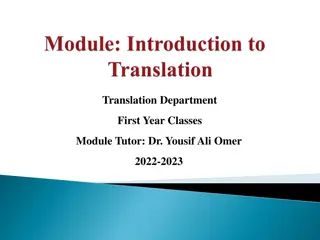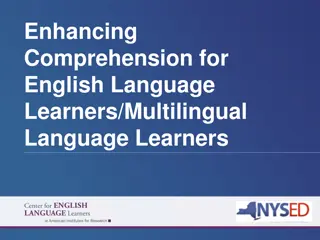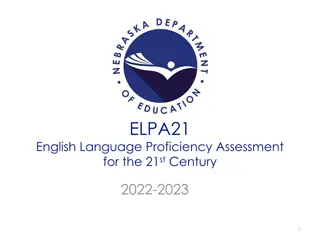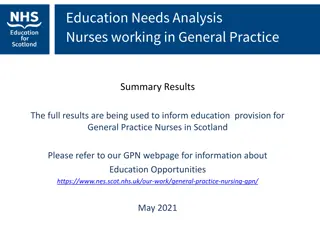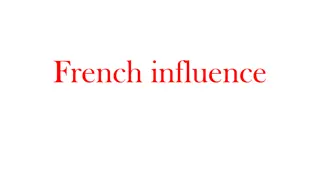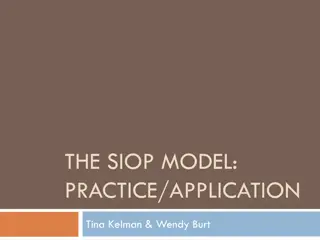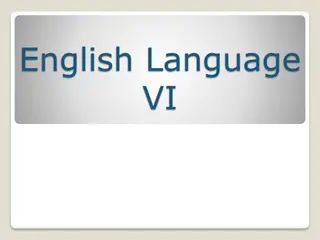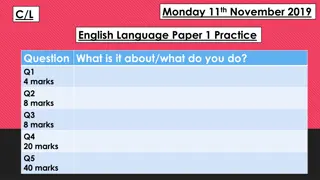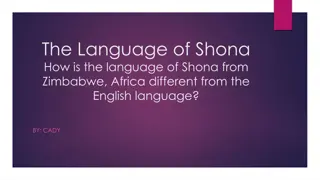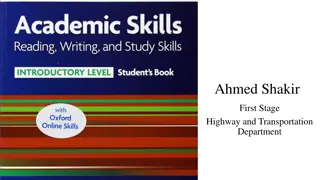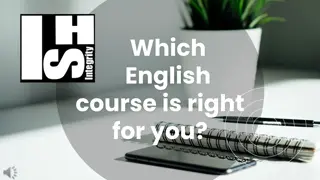General English Language Skills Practice Guide
Improve your English language skills with this comprehensive guide covering general vocabulary, strategies for listening and speaking, getting someone's attention, asking for help/offering help, common direction questions, and interactive practice scenarios. Enhance your communication abilities and fluency in English with practical examples and exercises.
Download Presentation

Please find below an Image/Link to download the presentation.
The content on the website is provided AS IS for your information and personal use only. It may not be sold, licensed, or shared on other websites without obtaining consent from the author.If you encounter any issues during the download, it is possible that the publisher has removed the file from their server.
You are allowed to download the files provided on this website for personal or commercial use, subject to the condition that they are used lawfully. All files are the property of their respective owners.
The content on the website is provided AS IS for your information and personal use only. It may not be sold, licensed, or shared on other websites without obtaining consent from the author.
E N D
Presentation Transcript
GENERAL PURPOSE ENGLISH Tedd Bayne
Overview Part 1 General vocabulary (Review) Getting Attention Ask for Help / Offer Help Common Direction Questions Interrupting for Attention Part 2 Strategies for Listening and Speaking I Don t Understand Cultural Issues Intonation Asking for Clarity Body Language Pronunciation
Getting Someones Attention Excuse me Pardon me Ex. You -> Someone: Excuse me, do you need some help? Someone -> You: Pardon me, can you help me? Be careful! These can be used in different ways! 1. Someone is trying to get past you. Ex. Excuse me, can I get by? 2. Someone didn t understand or hear you. Ex. Excuse me? Pardon me? What did you say? Pardon me, can I get through?
Ask for Help / Offer Help What You May Hear What You Can Offer Could you tell me . . . ? Do you know . . . ? Do you happen to know . . . ? I d like to know . . . Could you find out . . . ? I m interested in . . . ? I m looking for . . . ? Can I help you? Do you need some help? Are you looking for something? Are you looking for someone? May I help you? Would you like some help? Ex. Pardon me, do you need some help? Yes! I m looking for the elevators. Ex. Excuse me, do you know what time the meeting starts? Yes! The meeting starts at 2:30.
Lets Practice! Getting Someone s Attention Someone Getting Your Attention A: Excuse me, may I help you? B: Yes! Can you tell me which floor the International Student Services is on? A: It is on the ____ floor. B: Thanks! ------------------------------------------------------------ A: Pardon me, would you like some help? B: Yes, when do classes end for lunch? A: Classes end at ________. B: Thank you! B: Excuse me, do you know which building the Food Court is in? A: The Food Court is in ____ building. B: Thanks for the help! ------------------------------------------------------------ B: Pardon me, do you happen to know when classes end in the evening? A: Yes, classes end at _______. B: Okay, thank you!
Common Direction Questions Where is (the) . . . ? How do you get to (the) . . . (from here)? How do I get to (the) . . . ? Can you tell me how to get to (the) . . . ? Can you give me directions to (the) . . . ? What s the best way to get to (the) . . . ? Ex. Excuse me, where is the library? Ex. Pardon me, are you looking for something? Yes! Can you tell me now to get to room N606?
Lets Practice! A: ________, do you need some help? B: Yes, how do I get to F building? A: __________ B: Great, thanks! ________________________________________ B: ________, where is Academic Affairs? A: ______________ B: Thank you! ________________________________________ A: Pardon me, ______________________? B: Yes, can you give me directions to Student Affairs? A: _______________ B: Thank you very much! B: _________, can you tell how to get to room N614? A: _____________________ B: I see, thank you!
Give Directions Start End 1) Bursar M Building 2) 7-11 Residence Life 3) Library Bus Stop 4) Admissions Food (suggest a place to eat) Court 5) E Building Room MB114
Interrupting for Attention Pardon me, but . . .? Excuse me, but . . . ? I m sorry, but . . . ? I m sorry to interrupt, but . . . ? I don t want to interrupt, but . . . ? Ex. Excuse me, but do you need some help? I m sorry to interrupt, but are you looking for something?
I DONT UNDERSTAND!
Strategies for Listening and Speaking 1) Don t Panic! 2) Listen for key vocabulary. 3) Speak slowly. 4) Ask them to write it down. - Use your phone - Do they have papers or documents with the information?
I Dont Understand I m sorry, I don t quite understand. I m not quite sure what you mean. I don t quite see what you mean. Sorry, I don t see what you mean.
Cultural Issues - Intonation Excuse me -Getting attention - No rising intonation Excuse me? - Confused - Rising intonation at the end. Excuse me? - Offended or upset - Louder voice
Asking for Clarity Excuse me? Pardon me? You said . . . ? What was that? Say that again, please? Could you repeat that, please? Could you say that again, please? Could you speak more slowly, please? Do you mean . . .? What do you mean by . . . ?
Body Language What is your body language saying? Standing with hands on hips Crossing your arms Eye contact Handshake
Pronunciation - Reduction Numbers Twenty Twenny Thirty Thirdy Forty Fordy Fifty Fifdy Sixty Sixdy Ex. The meeting is on the twenty-first. The meeting is on the twenny-first. The coffee costs thirty dollars. The coffee costs thirdy dollars.
Pronunciation - Reduction To Have to Hafta Got to Gotta Going to Gonna Want to Wanna Ex. I have to leave now. I hafta leave now. You got to go to class. I gotta go to class. I m going to be late. I m gonna be late. I want to find this room. I wanna find this room.
Pronunciation - Reduction Of / Have Lots of Lotsuv OR A lot of A lotuv Could have Could ve Coulduv Would have Would ve Woulduv Ex. I have lots of time. I have lotsuv time. There are a lot of them. There are a lotuv them. I could have asked you. I coulduv asked you. I would have asked you. I woulduv asked you.
Pronunciation - Linking Sounds The j Sound Could you Couldjyou Would you Wouldjyou Did you Didjyou Ex. Could you help me, please? Couldjyou help me, please? What would you suggest? What wouldjyou suggest? What did you say? What didjyou say?
Pronunciation - Linking Sounds The w Sound Go on Gowon You are Youware Who are Whoware Ex. If you go on the third floor, you will find it. If you gowon the third floor, you will find it. You are in the wrong building. Youware in the wrong building. Who are you looking for?. Whoware you looking for?
Pronunciation - Linking Sounds The ch Sound Don t you Donchyou That you Thachyou What you Whachyou Ex. Why don t you ask the teacher? Why donchyou ask the teacher? Is this the room that you are looking for? Is this the room thachyou looking for? Is this what you were looking for? Is this whachyou were looking for?




